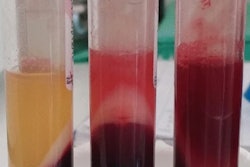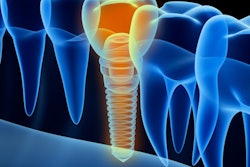
A medication used to treat cancer may have prevented a 58-year-old man from healing following an oral surgery procedure, according to a case report published May 11 in the Journal of the American Dental Association.
Weeks after the man underwent an extraction and a ridge preservation, he experienced delayed soft-tissue healing and loss of the coronal portion of the bone graft -- a delay likely due to the man taking the targeted cancer therapy imatinib. This is believed to be the first reported case of delayed gum tissue healing after oral surgery secondary to the use of imatinib, the authors wrote.
"Dental practitioners should be aware of the possibility of impaired healing after oral procedures in their patients taking imatinib," wrote the authors, led by Alan Myers, PharmD, PhD, of the University of Texas Health Science Center School of Dentistry in Houston.
58-year-old man with a dislodged crown
In December 2020, the patient presented for treatment at a prosthodontic clinic because he had a dislodged crown and core buildup in tooth #19. The year before, he had a gastrointestinal tumor removed and had been taking 400 mg of imatinib each day since this surgery. Otherwise, his medical history was unremarkable.
After being examined, the man agreed to an extraction, ridge preservation, and, in the future, a dental implant. The patient was given local anesthetic, and the tooth was extracted. The socket was curetted and irrigated with sterile water. The ridge was preserved, and the bone graft was covered, the authors wrote.
After the procedure, the patient was prescribed 875 mg of amoxicillin and clavulanic acid twice daily. Also, he was told to rinse with 15 mL of chlorhexidine twice daily and was told to take 600 mg of ibuprofen every six hours as needed for pain, they wrote.
At a follow-up appointment one week later, the patient reported not feeling any pain, initially. However, he stopped taking the antibiotics three days after the procedure because he could not tolerate the side effect of severe diarrhea. After stopping the antibiotics, he began feeling dull pain.
Though an intraoral exam showed that the site had no fluid and the sutures were in place, soft tissue at the site was red and painful when touched. The clinician prescribed him 500 mg of amoxicillin three times daily, according to the report.
After taking amoxicillin for three days, the man again began experiencing the same dull pain, as well as a "decay" taste. Since an intraoral exam revealed nothing unusual, the clinician removed the sutures to see if there was soft-tissue irritation. There was no exudate from the bone graft within the socket. It was irrigated once with chlorhexidine and multiple times with sterile water. Then, a membrane was placed over the bone graft, and the soft tissue was sutured, they wrote.
At five weeks after the procedure, the patient was not in pain, but the soft tissue had not healed completely. Additionally, an x-ray showed loss of the coronal portion of the bone graft, the authors wrote.
Revision surgery
At eight weeks after the initial procedure, the soft tissue was healing except for a 2x3-mm area at the midridge toward the lingual side at the mesial root. At that time, a revision surgery was performed due to the loss of the bone graft's coronal portion. After the surgery, the patient was prescribed 500 mg of amoxicillin three times daily and 15 mL chlorhexidine rinse to be used twice daily. For pain, he was told to take ibuprofen as needed, according to the report.
At the one-week postoperative exam, the man reported no pain, but the membrane was exposed. An intraoral exam revealed that the soft tissue was reddish. The clinician cut off the redundant fragments of the membrane and left the remaining membrane intact, because it still covered the bone graft and was held in place with sutures, they wrote.
At the two-week postoperative appointment, the man's soft tissue at the surgical site was still reddish. Since there were concerns that imatinib may be interfering with the healing, the patient's oncologist was consulted. The oncologist agreed that the man could discontinue the medication, and the patient stopped taking it 12 days after the revision surgery, they wrote.
At the four-week postsurgery exam, which was two weeks after the medication was stopped, the man's soft tissue was healing. There was a small reddish area, but it was smaller than it was at the prior appointment, the authors wrote.
At the six-week follow-up exam, the man's soft tissue had healed and completely covered the ridge of tooth #19. However, the ridge center was concave. An x-ray showed loss of the coronal portion of the bone graft, which was due to prior unhealed gum tissue, according to the report.
About seven months after the revision surgery, the soft tissue was healed completely, and the indentation was filled. Unfortunately, an x-ray revealed there was still bone loss. Since the oncologist recommended that the patient discontinue imatinib for four weeks, any follow-up procedures were paused indefinitely, they wrote.
Imatinib and its possible side effects
Imatinib is a tyrosine kinase inhibitor that is used to treat cancers that start in the white blood cells, as well as certain types of gastrointestinal stromal tumors. The drug works by blocking the action of the abnormal protein that signals cancer cells to multiply, which helps prevent cancer cells from spreading.
Multiple tyrosine kinase inhibitors, including pazopanib and axitinib, carry warning labels that cite wound-healing complications. However, imatinib does not.
Two case reports note that imatinib can delay the healing of leg ulcers and cause wound disruption. In these cases, the negative drug reaction subsided once the patients stopped taking imatinib.
In this case, it was highly likely that imatinib affected the man's tissue healing due its complex interactions with cells, tissues, and the immune system, according to the authors. Clinicians with patients taking imatinib should involve their oncologists in treatment planning, because the medication may need to be discontinued following oral surgeries, they wrote.
"Dental practitioners should consider the possibility of impaired healing among their patients taking imatinib, especially before procedures that damage gingival tissue, although this adverse drug reaction is not reported in the drug's package insert," Myers and colleagues wrote.




















